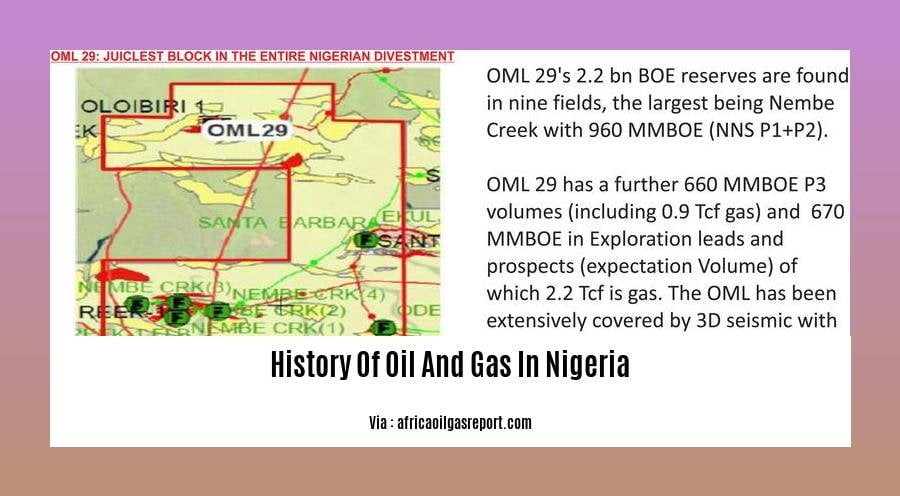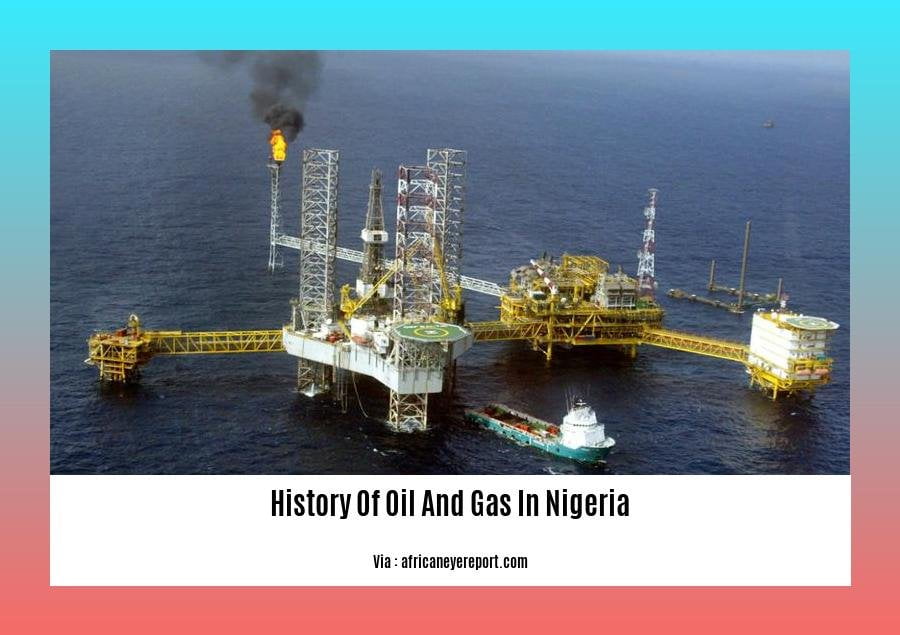Embark on a captivating journey through the annals of Nigeria’s hydrocarbon wealth in [A Journey Through Time: The History of Oil and Gas in Nigeria]. Delve into the chronicles of exploration, production, and the profound impact of Nigeria’s oil and gas industry on its economy and global energy dynamics.
Key Takeaways:
- Nigeria is the second-largest oil and gas producer in Africa.
- Nigeria’s economy and budget have relied heavily on income and revenues from the petroleum industry since 1960.
- Nigeria exports crude oil and petroleum products to the United States.
- Crude oil from the Niger Delta basin is available in light and comparatively heavy types.
History of Oil and Gas in Nigeria

Nigeria’s hydrocarbon wealth has played a pivotal role in shaping its economic and geopolitical landscape since the mid-20th century. Let’s delve into the enthralling narrative of Nigeria’s oil and gas industry, its milestones, challenges, and remarkable impact on the nation.
Nigeria’s Lucrative Liquid Gold
The story of Nigeria’s black gold begins in the 1900s when crude oil was discovered in the Niger Delta region. Commercial production commenced in 1958, marking the genesis of Nigeria’s oil-driven economy.
Since then, the nation has emerged as Africa’s leading oil producer, boasting vast reserves of both light and heavy crude. This liquid treasure has transformed Nigeria into a significant player in the global energy market.
The Socio-Economic Impact: A Double-Edged Sword
While oil has been a boon for Nigeria’s economy, its impact has been a double-edged sword. On one hand, petroleum revenues have fueled significant infrastructural development, education, and healthcare initiatives.
On the other hand, the nation’s over-reliance on oil has led to a neglect of other sectors, resulting in a lack of economic diversification and vulnerability to oil price fluctuations.
Challenges and Opportunities: Navigating a Complex Landscape
Nigeria’s oil and gas industry has faced a myriad of challenges over the years. Environmental degradation, pipeline vandalism, and political instability have hampered production and hindered sustainable development.
Despite these hurdles, Nigeria remains committed to harnessing its hydrocarbon resources for the betterment of its people. The government has implemented reforms to attract foreign investment, promote transparency, and drive local content development.
Additionally, there’s a growing focus on diversifying the economy, reducing reliance on oil, and transitioning to cleaner energy sources.
Nigeria’s Hydrocarbon Legacy: A Story of Potential and Progress
Nigeria’s history of oil and gas is a tale of potential and progress. From humble beginnings to becoming a global energy powerhouse, Nigeria’s journey in the hydrocarbon sector has been nothing short of remarkable.
As the nation navigates the challenges of the 21st century, its commitment to sustainable development, economic diversification, and energy transition will undoubtedly shape the future of its oil and gas legacy.
Learn about the rich history of Philippine architecture, influenced by various cultures, including its Spanish colonial past, on this comprehensive page: History of Philippine Architecture.
History of Oil Exploration

Since the dawn of the 20th century, Nigeria’s oil and gas industry has been on a remarkable journey. It all began in 1908 when the Nigerian Bitumen Corporation, a German company, ventured into Araromi and Okitipupa (in present-day Ondo State) in search of black gold. Yet, it wasn’t until 1956 that Shell-BP struck commercial oil at Oloibiri, leading to a new era for the nation.
The 1970s marked a turning point as Nigeria joined the ranks of the Organization of the Petroleum Exporting Countries (OPEC), asserting its position as a significant player in the global energy landscape. However, in the ensuing decades, oil production faced challenges, including political instability, sabotage, and oil theft, leading to a decline in output. Despite these hurdles, Nigeria’s oil and gas industry remains a cornerstone of the nation’s economy, shaping its socio-economic trajectory.
Key Takeaways:
The first oil exploration in Nigeria dates back to 1908, conducted by the Nigerian Bitumen Corporation.
Commercial oil discovery was achieved in 1956 at Oloibiri by Shell-BP, marking a pivotal moment for the industry.
In 1971, Nigeria joined the Organization of the Petroleum Exporting Countries (OPEC), solidifying its role in the global energy scene.
While Nigeria’s oil production peaked in the 1970s, it has since declined due to various factors, including political instability and oil theft.
Despite these challenges, Nigeria’s oil and gas industry remains a crucial pillar of the nation’s economy, underpinning its socio-economic development.
Sources:
- Brief History of Oil and Gas in Nigeria
- History of oil and gas industry from 347 AD to 2019
History of Nigerian Oil and Gas Industry
In this article, we travel back in time to explore the fascinating journey of the Nigerian oil and gas industry – an industry that has shaped the nation’s socio-economic landscape and solidified its position on the global energy map.
Key Historical Milestones:
1908: The curtain rises on Nigeria’s oil exploration journey as the Nigerian Bitumen Corporation drills in Araromi and Okitipupa.
1956: A pivotal moment arrives as Shell-BP strikes oil at Oloibiri, ushering in a new era for Nigeria’s oil and gas industry.
1971: Nigeria joins forces with the Organization of the Petroleum Exporting Countries (OPEC), solidifying its status as a major player on the global energy stage.
1970s: Challenges emerge as political instability, sabotage, and oil theft leave their mark, leading to a decline in oil production.
Navigating the Tides of Change:
Despite these obstacles, the Nigerian oil and gas industry has remained resilient, playing a pivotal role in the nation’s economic development. Here’s how:
Revenue Generation: Oil revenues have been a significant contributor to Nigeria’s gross domestic product (GDP), providing the financial backbone for various sectors.
Foreign Exchange: Oil exports have generated substantial foreign exchange earnings, supporting the country’s trade balance and stabilizing its currency.
Employment Opportunities: The industry has created numerous direct and indirect employment opportunities, contributing to the growth of the Nigerian workforce.
Infrastructure Development: Oil revenues have played a crucial role in funding infrastructure projects, including road networks, power plants, and healthcare facilities.
Confronting Ongoing Challenges:
While the Nigerian oil and gas industry has come a long way, it continues to face several challenges that require ongoing attention:
Environmental Impact: Oil spills and gas flaring have raised concerns about environmental pollution, necessitating effective measures for sustainable practices.
Security Issues: The industry has faced security threats, such as pipeline vandalism and oil theft, which have led to production disruptions and revenue losses.
Reliance on Oil: Nigeria’s heavy dependence on oil revenues exposes it to fluctuations in global oil prices, leading to economic vulnerability.
Key Takeaways:
Early Exploration: Nigeria’s oil exploration journey began in 1908 with the Nigerian Bitumen Corporation.
Commercial Discovery: Commercial oil success struck in 1956 at Oloibiri, transforming Nigeria’s oil and gas landscape.
OPEC Membership: In 1971, Nigeria joined OPEC, solidifying its position in the global energy market.
Challenges and Decline: The industry faced challenges in the 1970s, including political instability and oil theft, leading to a decline in production.
Economic Contribution: Oil revenues have significantly contributed to Nigeria’s GDP, foreign exchange earnings, employment creation, and infrastructure development.
Environmental Concerns: Oil spills and gas flaring have highlighted the need for sustainable practices in the industry.
Security Challenges: Pipeline vandalism and oil theft pose security threats, causing production disruptions and revenue losses.
Reliance on Oil: Nigeria’s dependence on oil revenues exposes it to global oil price fluctuations, leading to economic vulnerability.
Sources:
History of the Nigerian Oil and Gas Industry
FAQ
Q1: When did oil exploration begin in Nigeria?
A1: Oil exploration in Nigeria dates back to 1908 when a German company, Nigerian Bitumen Corporation, explored for oil in the Araromi and Okitipupa areas of the present-day Ondo State.
Q2: When was the first commercial oil discovery made in Nigeria?
A2: The first commercial oil discovery in Nigeria was made in 1956 by Shell-BP at Oloibiri in the Niger Delta region.
Q3: How has the oil and gas industry contributed to Nigeria’s economy?
A3: The oil and gas industry has played a significant role in supporting Nigeria’s economy and budget since 1960, contributing approximately 9% to the country’s GDP.
Q4: Is Nigeria a member of OPEC?
A4: Yes, Nigeria became a member of the Organization of the Petroleum Exporting Countries (OPEC) in 1971, solidifying its position as a key player in the global oil market.
Q5: What are some challenges facing the oil and gas industry in Nigeria?
A5: The oil and gas industry in Nigeria has faced several challenges, including political instability, sabotage, and oil theft, which have impacted oil production and revenue generation for the country.












